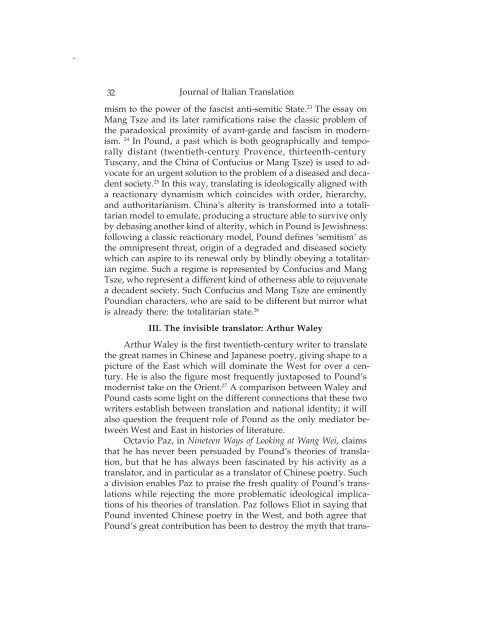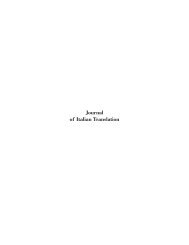Journal of Italian Translation
Journal of Italian Translation
Journal of Italian Translation
Create successful ePaper yourself
Turn your PDF publications into a flip-book with our unique Google optimized e-Paper software.
32 <strong>Journal</strong> <strong>of</strong> <strong>Italian</strong> <strong>Translation</strong><br />
mism to the power <strong>of</strong> the fascist anti-semitic State. 23 The essay on<br />
Mang Tsze and its later ramifications raise the classic problem <strong>of</strong><br />
the paradoxical proximity <strong>of</strong> avant-garde and fascism in modernism.<br />
24 In Pound, a past which is both geographically and temporally<br />
distant (twentieth-century Provence, thirteenth-century<br />
Tuscany, and the China <strong>of</strong> Confucius or Mang Tsze) is used to advocate<br />
for an urgent solution to the problem <strong>of</strong> a diseased and decadent<br />
society. 25 In this way, translating is ideologically aligned with<br />
a reactionary dynamism which coincides with order, hierarchy,<br />
and authoritarianism. China’s alterity is transformed into a totalitarian<br />
model to emulate, producing a structure able to survive only<br />
by debasing another kind <strong>of</strong> alterity, which in Pound is Jewishness:<br />
following a classic reactionary model, Pound defines ‘semitism’ as<br />
the omnipresent threat, origin <strong>of</strong> a degraded and diseased society<br />
which can aspire to its renewal only by blindly obeying a totalitarian<br />
regime. Such a regime is represented by Confucius and Mang<br />
Tsze, who represent a different kind <strong>of</strong> otherness able to rejuvenate<br />
a decadent society. Such Confucius and Mang Tsze are eminently<br />
Poundian characters, who are said to be different but mirror what<br />
is already there: the totalitarian state. 26<br />
III. The invisible translator: Arthur Waley<br />
Arthur Waley is the first twentieth-century writer to translate<br />
the great names in Chinese and Japanese poetry, giving shape to a<br />
picture <strong>of</strong> the East which will dominate the West for over a century.<br />
He is also the figure most frequently juxtaposed to Pound’s<br />
modernist take on the Orient. 27 A comparison between Waley and<br />
Pound casts some light on the different connections that these two<br />
writers establish between translation and national identity; it will<br />
also question the frequent role <strong>of</strong> Pound as the only mediator between<br />
West and East in histories <strong>of</strong> literature.<br />
Octavio Paz, in Nineteen Ways <strong>of</strong> Looking at Wang Wei, claims<br />
that he has never been persuaded by Pound’s theories <strong>of</strong> translation,<br />
but that he has always been fascinated by his activity as a<br />
translator, and in particular as a translator <strong>of</strong> Chinese poetry. Such<br />
a division enables Paz to praise the fresh quality <strong>of</strong> Pound’s translations<br />
while rejecting the more problematic ideological implications<br />
<strong>of</strong> his theories <strong>of</strong> translation. Paz follows Eliot in saying that<br />
Pound invented Chinese poetry in the West, and both agree that<br />
Pound’s great contribution has been to destroy the myth that trans-

















